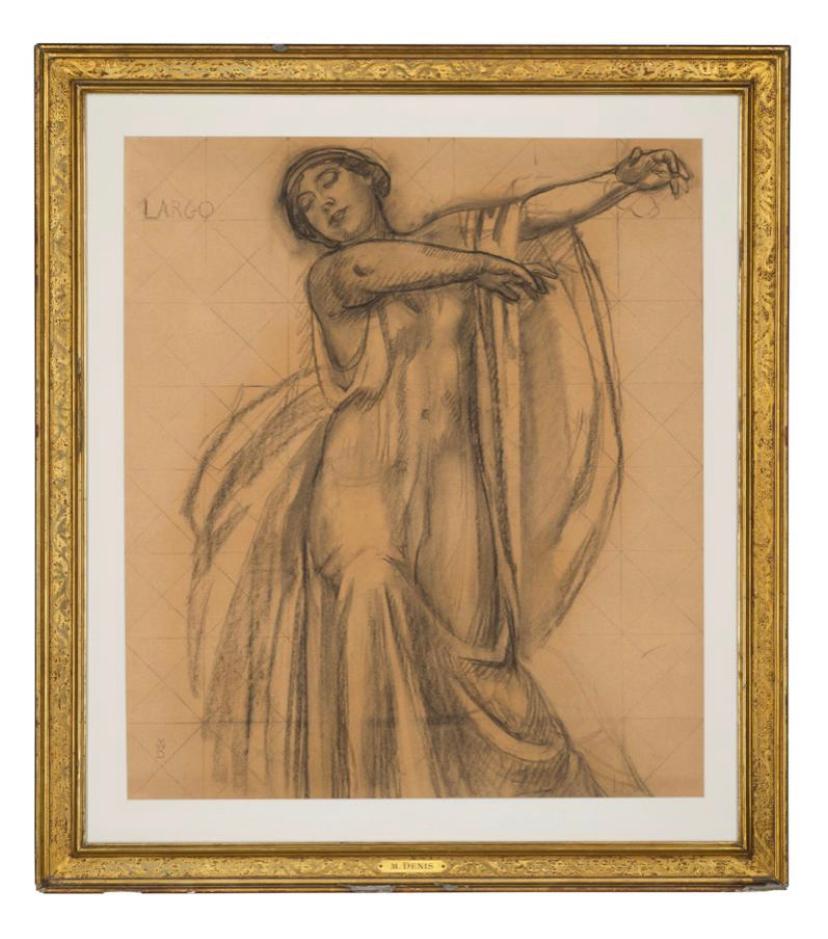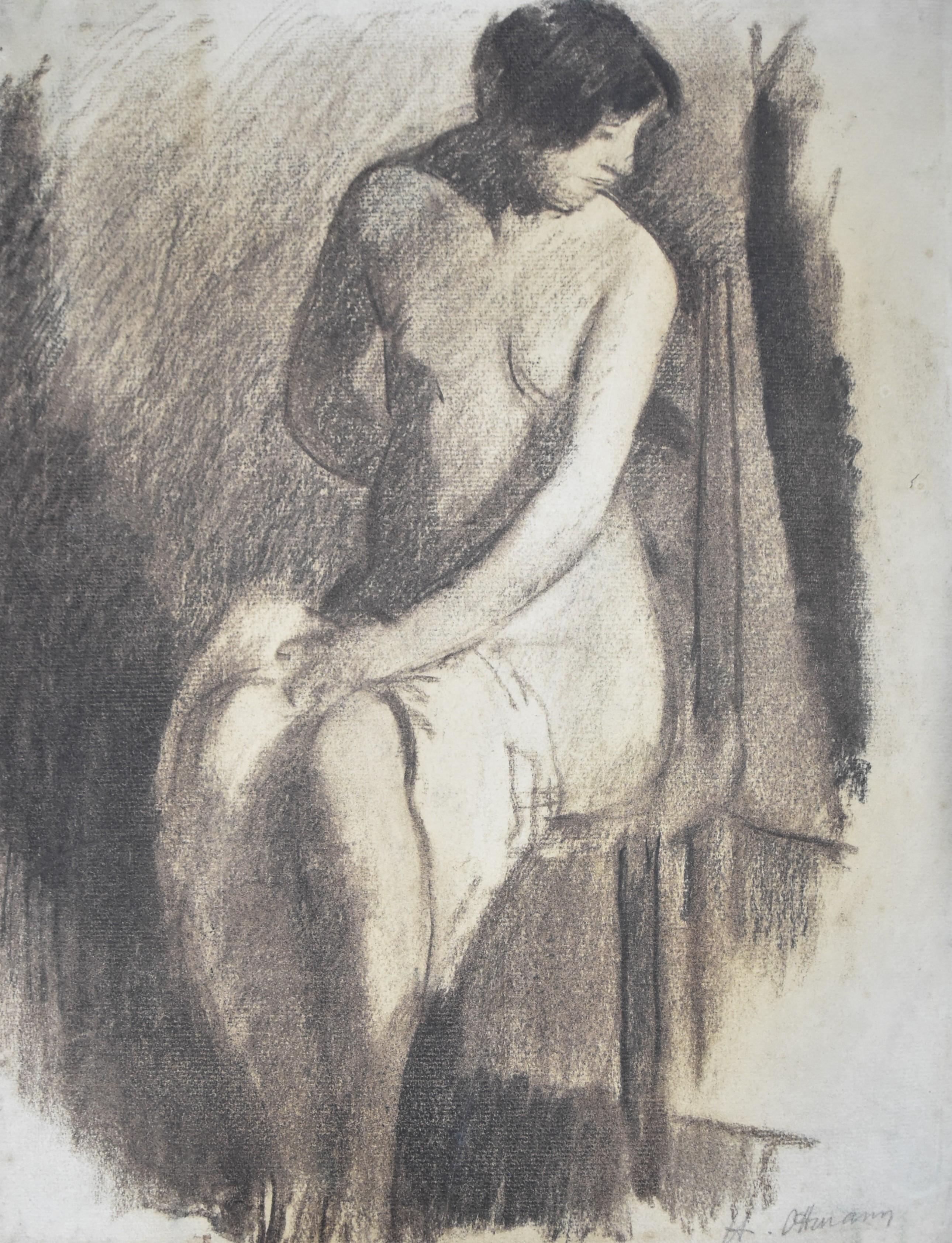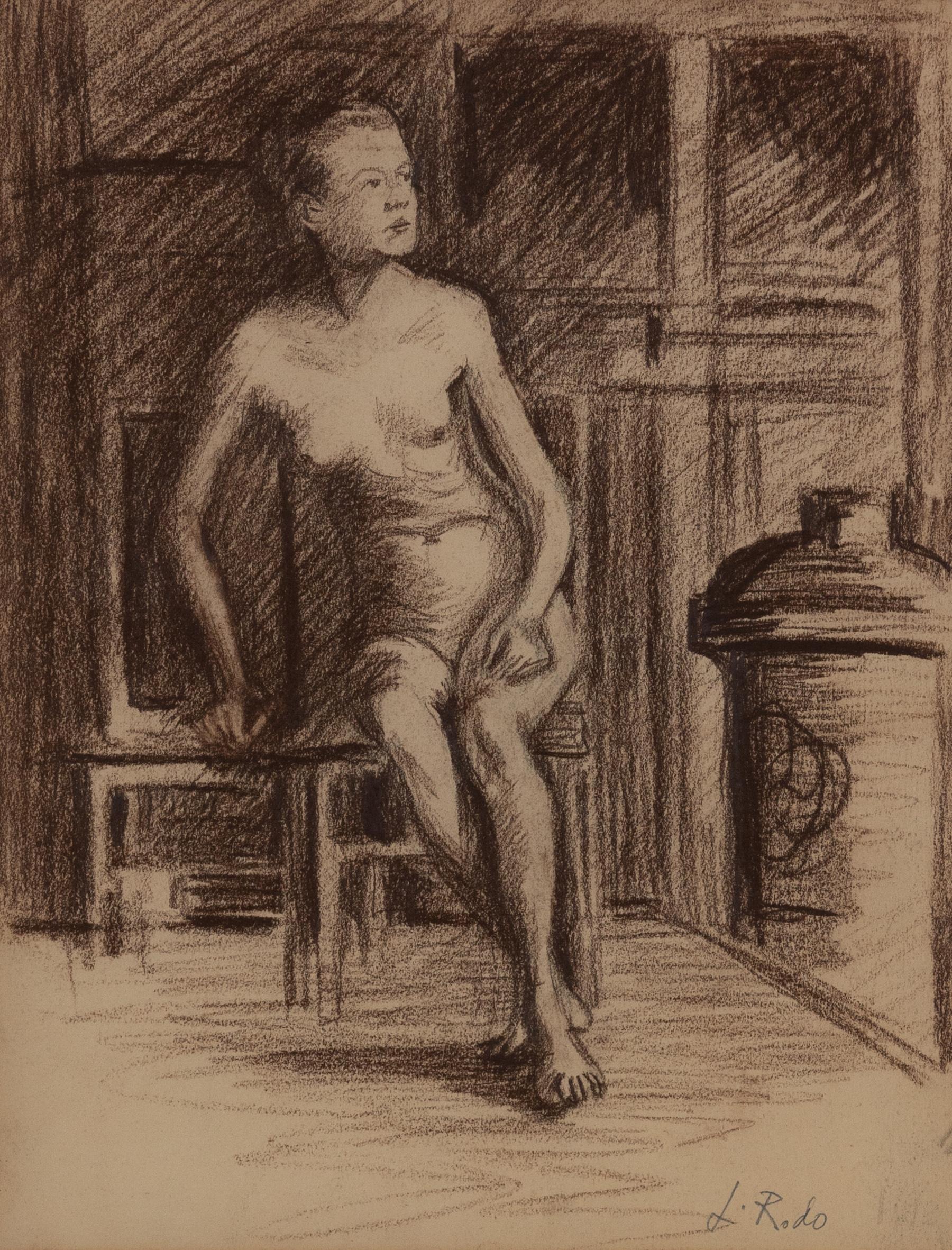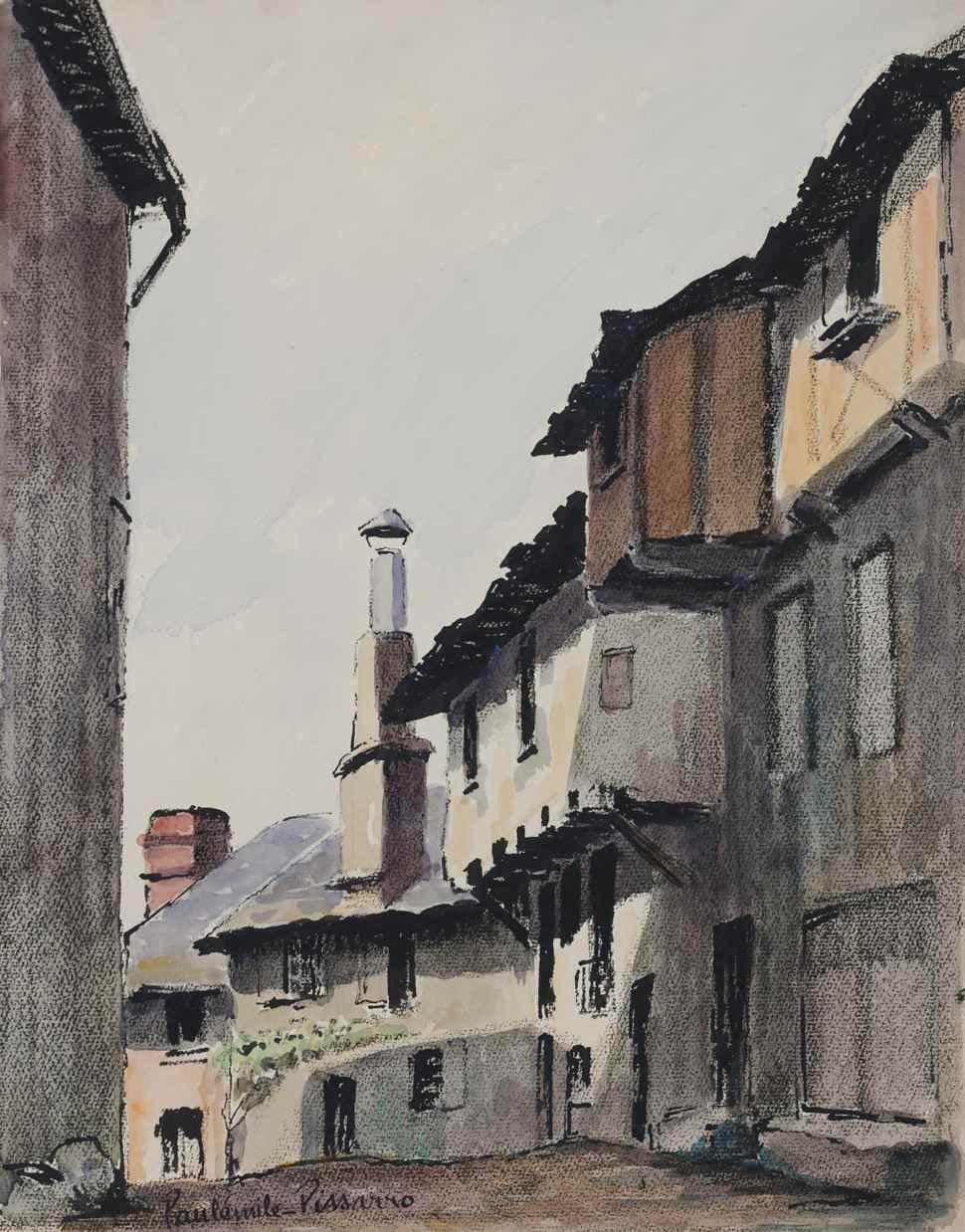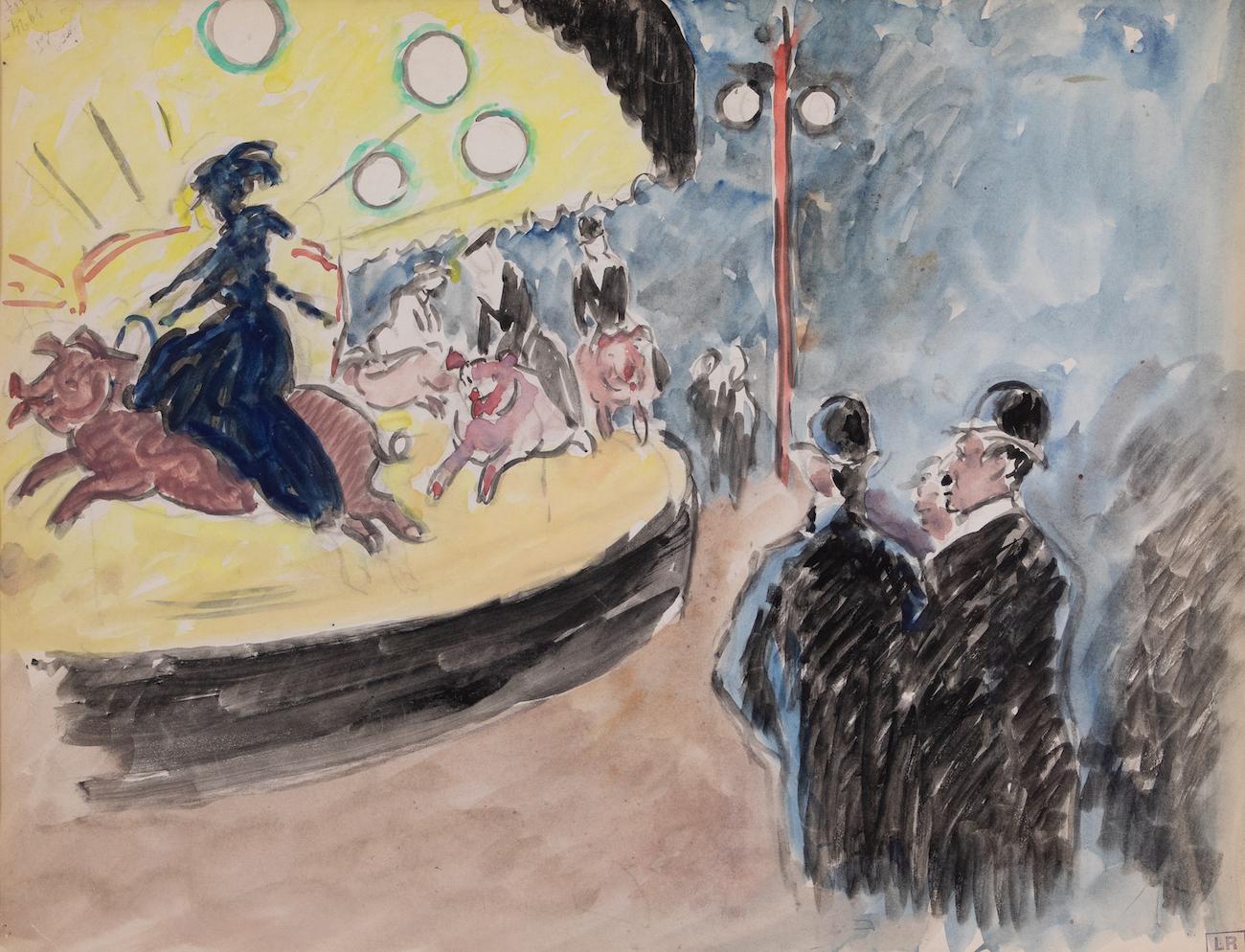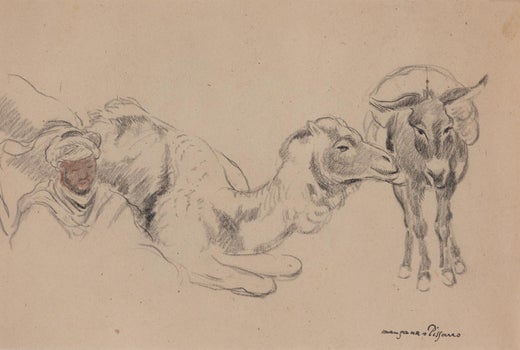Georges Henri Manzana PissarroUne Femme Turque by Georges Manzana Pissarro - Work on papercirca 1910
circa 1910
About the Item
- Creator:Georges Henri Manzana Pissarro (French)
- Creation Year:circa 1910
- Dimensions:Height: 18.51 in (47 cm)Width: 12.01 in (30.5 cm)
- Medium:
- Movement & Style:
- Period:
- Condition:
- Gallery Location:London, GB
- Reference Number:1stDibs: LU261211407662
Georges Henri Manzana Pissarro
Georges-Henri Pissarro, better known as Manzana, was born in Louveciennes, the third of Camille Pissarro and Julie Vellay’s seven children.
He studied with his father from a very early age and, like Lucien — Camille and Julie's eldest son — he spent his formative years surrounded by distinguished artists of the Impressionist movement, such as Monet, Cézanne, Renoir and Gauguin, all of whom frequented the Pissarro home. At his father's side he learned not only to handle brush and pencil but also to observe and to love nature.
Thus steeped in tradition and subjected to these diverse influences, Manzana turned out to be a prolific and versatile artist, producing work in oil, pastel and watercolour. As a young man he adopted his father's purely Impressionist style and produced a series of landscapes around Pontoise and Eragny. However, around 1906 he progressed beyond that and went in search of other means of expression via the design of furniture and decorative objects. The influence of Gauguin's exotic native scenes from Tahiti and Martinique certainly contributed to the development of Manzana's Orientalism, which at this time began to manifest itself in some of his paintings by his experimenting with gold, silver and copper paint.
Like all the second generation Pissarro artists, Georges initially worked under an assumed name. In 1894 he adopted "Manzana,” the family name of his maternal grandmother, and it was not until 1910, out of respect to his then-deceased father, that he employed his own family name when signing his work.
During the early 1900s Manzana regularly exhibited Impressionist works at the Salon d'Automne and the Salon des Indépendants, as well as Durand Ruel and Druet in Paris. In 1907 he had his first exhibition of decorative works at Vollard, but it was in 1914 that he had the most important exhibition of his career at the Musée des Arts Décoratifs, where he exhibited 311 works including tapestries, carpets, furniture, glassware, decorative paintings, etchings and lithographs.
Manzana continued to exhibit his work regularly until the late 1930s, splitting his time between Les Andelys and Paris, although spending several summers at Pont Aven in Brittany, where the local costume and lifestyle inspired a series of paintings in the 1930s. At the declaration of war in 1939, he moved with his family to Casablanca, where he stayed until 1947.
Manzana was married and widowed three times. He spent the last years of his life with Félix, his youngest son who was also an accomplished artist, in Menton, returning to the Impressionist tradition and painting the local landscape.
(Biography provided by Stern Pissarro Gallery)
- ShippingRetrieving quote...Ships From: London, United Kingdom
- Return PolicyA return for this item may be initiated within 7 days of delivery.
- Nu Assise by Ludovic-Rodo Pissarro - Nude drawingBy Ludovic-Rodo PissarroLocated in London, GBNu Assise by Ludovic-Rodo Pissarro (1878-1952) Charcoal on paper 31.3 x 24.2 cm (12 ⅜ x 9 ½ inches) Signed lower right, L.Rodo This work of art is accompanied by a certificate of authenticity signed and dated by Lélia Pissarro. Artist biography: Ludovic-Rodolphe Pissarro, born in Paris in 1878, was Camille Pissarro’s fourth son. Encouraged by his father, he began drawing from nature at an early age. He was familiarly known as “Rodo” and generally signed his works "Ludovic-Rodo", or early on in his career simply "Rodo". The impact of Camille’s art and teaching on Rodo was considerable. His artistic production encompassed a wide range of media, including oil painting, tempera, watercolour, gouache, wood engraving, drawing and lithography. Rodo exhibited regularly at the Salon des Indépendants over a forty-year period. In 1894, at the age of sixteen, Rodo published his first wood engravings in the anarchist journal, Le Père Peinard. When Camille left France for the safety of Belgium during the anarchist upheavals of the same year, Rodo joined him there. Rodo moved into his first studio in Montmartre with his brother Georges in 1898. Works of this early important period until just after the death of his father in 1903 were post-impressionist and clearly painted under the influence of his father. By 1904 living in Paris, he found the nightlife and the habitués of the cafes, theatres, circuses and cabarets compelling subjects for his work and changed dramatically the style of his painting, affiliating himself to the Fauve artists. Rodo became close to artists such as Kees Van Dongen, Maurice de Vlaminck and Raoul Dufy. In 1905 he participated in the first Fauve exhibition at the Salon des Indépendants. In 1907 he visited Van Dongen in Rotterdam and the two artists continued to paint together, something they often did in Paris. In 1914 he married, though he never had children. Later that year at the outbreak of the War Rodo moved to England. Over the next seven years he lived mainly in and around West London. He worked closely with his brother Lucien to establish in 1915 the Monarro Group, formed with the aim of exhibiting work by contemporary artists inspired by Impressionism. Many of the works produced by Rodo while he was in England were of London landmarks but, he was also interested in the urbanisation of West London. After 1921, when Rodo had already returned to France, he divided his time between Paris and Les Andelys in Normandy, living and working closely with his elder brother Georges Manzana. Despite his rich artistic heritage and his achievements as an artist, Rodo is perhaps best remembered for his contribution to art history. For ten years he researched and compiled a catalogue of his father’s paintings...Category
Early 1900s Post-Impressionist Figurative Drawings and Watercolors
MaterialsPaper, Charcoal
- Village in Normandy, Watercolour on Paper by Paulémile Pissarro, 1920Located in London, GBVillage in Normandy by Paulémile Pissarro (1884 - 1972) Watercolour, ink and charcoal on paper 40 x 31.2 cm (15 ³/₄ x 12 ¹/₄ inches) Signed lower left, Paulémile Pissarro Executed ...Category
1920s Post-Impressionist Figurative Drawings and Watercolors
MaterialsWatercolor, Charcoal, Ink
- La Fête Foraine by Ludovic-Rodo PissarroBy Ludovic-Rodo PissarroLocated in London, GBLa Fête Foraine by Ludovic-Rodo Pissarro (1878-1952) Watercolour and charcoal on paper 49.4 x 64.6 cm (19 ½ x 25 ⅜ inches) Signed with Estate stamp (monog...Category
Early 1900s Fauvist Figurative Drawings and Watercolors
MaterialsCharcoal, Paper, Watercolor
- Le corp de ferme by Paulémile Pissarro - WatercolourBy Paul Emile PissarroLocated in London, GB*UK BUYERS WILL PAY AN ADDITIONAL 20% VAT ON TOP OF THE ABOVE PRICE Le corp de ferme by Paulémile Pissarro (1884-1972) Watercolour, ink and charcoal on paper 29.7 x 46.8 cm (11 ³/₄ ...Category
1910s Post-Impressionist Figurative Drawings and Watercolors
MaterialsPaper, Charcoal, Ink, Watercolor
- Le Petit Cheval by Georges Manzana Pissarro - Animal charcoal drawingBy Georges Henri Manzana PissarroLocated in London, GBSOLD UNFRAMED Le Petit Cheval by Georges Manzana Pissarro Charcoal and gold on paper 31 x 31 cm (12 ¼ x 12 ¼ inches) Signed lower right, Manzana Pissarro Executed circa 1920 Proven...Category
1920s Post-Impressionist Animal Drawings and Watercolors
MaterialsGold
- Le Ramassage de Foin by Paulémile Pissarro - Work on paperBy Paul Emile PissarroLocated in London, GB*UK BUYERS WILL PAY AN ADDITIONAL 20% VAT ON TOP OF THE ABOVE PRICE Le Ramassage de Foin by Paulémile Pissarro (1884-1972) Charcoal on paper 26 x 33 cm (10 ¹/₄ x 13 inches) Signed l...Category
20th Century Post-Impressionist Figurative Drawings and Watercolors
MaterialsPaper, Charcoal
- LargoBy Maurice DenisLocated in New York, NYMaurice Denis' extravagant charcoal drawing of a romantic draped figure with outstretched arms is a rare work from the post impressionist period. Signed with monogram (lower left) a...Category
1920s Post-Impressionist Figurative Drawings and Watercolors
MaterialsCharcoal, Paper
- Coastal landscape, 1882Located in PARIS, FRFrank Charles Peyraud (1858-1948) Coastal landscape, 1882 Charcoal and shading on paper Signed "C. Peyraud", dated "82" and dedicated "à l'ami Baradat" ? lower right 29.5 x 56 cm Slightly oiled A French-born artist born in Switzerland in 1858, Frank Charles Peyraud showed an early interest in drawing and painting. He grew up in a rural environment before studying architecture at the Swiss Federal Institute of Technology in Zurich, encouraged by his father. In 1877, he entered the École des Beaux-Arts in Paris. In 1881, Frank Peyraud...Category
1880s Post-Impressionist Landscape Drawings and Watercolors
MaterialsCharcoal
- Henri Ottmann (1877-1927) Nude in the studio, drawing signedBy Henri OttmannLocated in Paris, FRHenri Ottmann (1877-1927) Nude in the studio signed lower right Charcoal on paper 37.5 x 31.5 cm In good condition In a modern frame : 53 x 46.5 cm Published under n°414 of the artist's catalogue raisonné (p 167 reproduced) published by Bernard Toublanc-Michel, Paris 2020 This drawing is a particularly interesting and touching example of Henri Ottmann's art. It shows his special technique, which gives priority to a kind of blur, and in this case it serves very well this scene of intimacy as if captured by stealth. Henry Ottmann was born on 10 April 1877 in Ancenis. He made his debut at the Salon La Libre Esthétique in Brussels in 1904 and took part in the Salon des Indépendants in Paris from 1905, the Salon d'Automne, the Salon de la Société Nationale des Beaux-Arts and the Salon des Tuileries. In 1911 and 1912, Ottmann exhibited at the Artistes de la Société Moderne at the Gallery Paul Durand...Category
1910s Post-Impressionist Nude Drawings and Watercolors
MaterialsCharcoal
- 'The Agony in the Garden', Paris, Salon d’Automne, Section d'Or, GethsemaneBy Jais NielsenLocated in Santa Cruz, CASigned lower left, 'Jais' for Johannes Knud Ove Jais-Nielsen (Danish, 1885-1961) and dated 1938. A powerful figural work showing a view of Jesus kneeling in the Garden of Gethsemane on the evening before his trial and execution. Born in Denmark, Jais Nielsen initially studied at Kunstnernes Frie Studieskoler under Kristian Zahrtmann and exhibited for the first time at the 1907 Autumn Salon at the Charlottenborg Palace. Nielsen participated in the early and groundbreaking, “Group of Thirteen" Modernist show, where his focus on dynamic figural painting and his bold use of color set him dramatically apart from his contemporaries. From 1907-11, Nielsen's use of 'primitive' Fauve colors would continue to reinforce his break with traditional Danish painting. During this period, he made study excursions to important art centres, including, in 1909, to Berlin. In 1911, he moved to Paris where he settled in the Latin Quarter near the Musée Cluny. His first formal Paris exhibition was at the Salon d’Automne of 1912. During this first Paris period, Nielsen attended meetings of the Section d’Or at the studio of Jacques Villon and, as a result, began to incorporate subtle, yet distinct, Cubist elements into his work. With the outbreak of World War One, Nielsen returned to Copenhagen, taking with him both his increasing compositional sophistication and a thorough understanding of the principles of Modernism. During this period, ports, dance and circus life became subjects of interest and he painted many canvases in the style of Analytic Cubism, of which he became the earliest and, arguably, the finest Danish exponent. From 1915 onwards, Nielsen also created Cubist sculptures and, from 1922-28, was employed as a sculptor by the Royal Copenhagen porcelain factory. Here, he produced a series of ceramic sculptures on Biblical themes which included the Good Samaritan and several versions of Jacob Wrestling with the Angel...Category
1930s Post-Impressionist Figurative Drawings and Watercolors
MaterialsGraphite, Charcoal, Paper, Gouache, Watercolor
- 'Woman Seated' Paris, Louvre, Salon d'Automne, Académie Chaumière, LACMA, SFAABy Victor Di GesuLocated in Santa Cruz, CACreated circa 1955 by Victor Di Gesu (American, 1914-1988) and stamped, verso, with certification of authenticity. Winner of the Prix Othon Friesz, Victor di Gesu first attended th...Category
1950s Post-Impressionist Figurative Drawings and Watercolors
MaterialsPaper, Charcoal, Cardboard
- Galloping Horses - Charcoal on Paper by Giuseppe Cominetti - 1916By Giuseppe CominettiLocated in Roma, ITGalloping Horses is a wonderful and original drawing in charcoal on paper, realized by the italian divisions artist Giuseppe Cominetti. Hand-signed in charcoal and dated on the lower...Category
1910s Post-Impressionist Animal Drawings and Watercolors
MaterialsCharcoal
